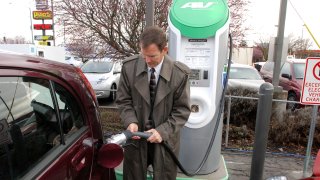
There are plenty of reasons not to buy an electric vehicle in 2024: Auto loan rates are high. Despite a recent wave of discounting, many EVs remain pricier than gas-burning cars. And an incomplete network of sometimes glitchy chargers has stoked drivers’ “range anxiety” about running out of juice.
But while the all-electric market is slowing, sales are forecast to keep rising. Cox Automotive expects EVs to comprise 10% of the United States’ vehicle market by the end of the year, up from 7.6% last year — when domestic sales hit a record 1.2 million — and 5.9% in 2022. And first-time EV adopters are still powering the expansion, with LexisNexis Risk Solutions telling NBC News that 3 in 4 new EVs are driven by people switching from a combustion-engine vehicle.
Here’s what to know if you’re considering buying this year.
Tax credits cover fewer models, but without the wait
Get top local stories in Southern California delivered to you every morning. >Sign up for NBC LA's News Headlines newsletter.
Car shoppers can still expect to be rewarded for going electric, thanks to tax breaks from the Inflation Reduction Act, but the rewards won’t be as widespread.
The law’s tax incentives are limited to EVs whose batteries aren’t substantially built in certain foreign countries, particularly China, or with minerals sourced there. The number of models eligible for the full federal tax credit of $7,500, or partial $3,750 credit, shrank from 43 last year to fewer than 15 that comply with criteria on the books currently. The punted models include popular picks like the Tesla Model 3 and the Nissan Leaf.
Read the full story on NBCNews.com here.

